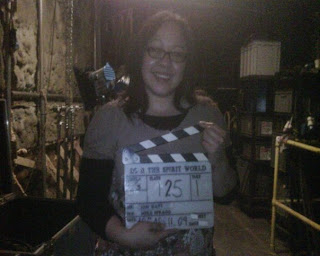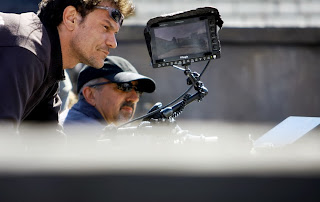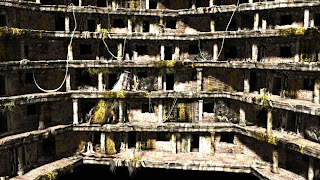How are you my lovely blogettes, still with me even after such a long gap between postings? I hope so.
So much has happened recently, most of which I'm not able to elaborate on for boring legal issues but here are some highlights:
- I finished the bible and the full 22 episode synopsis for my US supernatural show. The producers are now talking with US networks and some pretty amazing showrunners. We're hoping to find one to run the show until yours truly can get the experience required for such a badass role.
- One of my supernatural thriller screenplays has garnered interest from four companies so far. I'm meeting with all to see who can provide us with a happy home. Hopefully this will be my first feature film to get made.
- Another feature film, a high concept family flick has now made it's way to a studio for consideration. It requires a pretty big budget so fingers crossed!
- My role as "generator-of-ideas-for-companies" has gone into full swing with five new projects under consideration: a sci fi TV series, three family films and a ghost story.
- And finally, I'm now in discussions with the producer of some of my favourite films of all time(!!!) on not one, but two film projects. I've already met with him on a few occasions but it will be a long while before I don't geek out when I see him. Just so you guys know how huge this is for me, my cat is named after a character in the films...
All of this is basically to excuse away my tardiness with the blogging. As you can see, it's been a pretty busy two months.
And now, back to business. A few weeks past, I asked on Twitter if anyone would be interested in knowing the technicalities behind creating my US genre show and the response was far greater than I had anticipated. Needless to say, I shall be doubly careful what I tweet from now - you guys really
are listening.
So, onwards to my new show, a 22 episode behemoth set in the States. As it's currently being pitched, I can't go into much detail on what it's actually about but I can talk a little on how I physically wrote the thing in the hopes that it can help some of you out there, who are wanting to do the same but not knowing quite where to start.
Disclaimer: The following is how my brain generates ideas. I work this way as it's efficient, which as a professional screenwriter, I need to be. What I don't do is spend a year or two thinking in broad strokes on an idea - who has the time? I come up with something then I run with it. I usually aim to get the bulk of the idea down within a couple of weeks. Any longer than that and it's too easy to run out of steam...
In creating a television series, typically, a writer will come up with the series bible, a long document that details what the show is about. There are entire books written on this subject however, I'll try and touch upon the basics here.
Subjects the bible can cover are:
- Introduction, covering a short (a page or so) description of the story including what challenges the leads will face at the end of the first season here.
- Themes and Tone
- The World, if your introduction doesn't cover this, you can slot this into the bible.
- Backstory
- The Characters
- Season 1 Episode Synopses
- Further Season Arcs. If you're aiming for more than one season, brief paragraphs of possible season arcs can go here if you're so inclined.
Depending on what genre you're going for, they may well be more topics to cover but these cover the foundation. As long as you have these, you're in pretty good stead.
The below is my actual thought process which doesn't necessarily follow the steps above - quite often, the theme doesn't become clear until you have generated the characters and story - however by the end of writing, I will always go back and include the above topics into the final bible.
Conception
To create my show, I first thought about the type of show I wanted to write. Being a genre writer, I knew I wanted to do a supernatural show with four protagonists. I thought about the current landscape of similar US shows, for similar target audiences and how mine could fit in yet still be different, how it could have its own identity. I knew I wanted to go dark with this one, edgy and to shy away from soapy elements (The Vampire Diaries, I'm looking at you); this would be a supernatural show first and foremost. After coming up with what these supernatural elements were, I moved onto the next part - and the most crucial for me - the characters...
Characters
This is key; I always start with the characters. Some people go with plot, particularly for genres such as event sci fi... But for me, characters are king.
I began by writing a biography for one of the leads. This can and will change as you work on the other characters and find the best conflicts for them, adapting as necessary. When Lead 1 was completed, I moved onto the next, making sure that this new character was as different as night and day. From there, I created Lead 3 and 4. Once their basic bios were done, I took a look at the group as a whole to see how they would interact with each other. Alliances would naturally be formed between the girls; maybe something in their past would echo in their current issues. Conversely, some of the girls would be antagonistic as their attitude clashes with the others. This all adds to the fun. If all the leads had similar lives and interests, that would make for a very boring show. Conflict is created when people are forced together who wouldn't normally cross each other's paths, with the drama playing out as they attempt to navigate whatever danger is thrown their way. As such, I created leads from different classes and ethnicities where one or two come from broken homes while another seemingly has the perfect parents and lifestyle.
In the girl's bios, I created some family background then described their characters, perhaps highlighting an incident in their life that has shaped who they are today. When the four leads were completed, I moved on to the other reoccurring characters. Usually by this point, you'll already know who some of these are as you would have touched on them in the lead's bios, for example: Lead 1's younger sister who has a habit of stealing, or Lead 2's ex boyfriend who refuses to stay dumped...
You'll also need your antagonist. Who's the big bad? And more importantly, what do they want? This last question is crucial to the series and your leads. Without knowing this, you don't have a show. Once you've shaped all the people that inhabit your world, it's time to think about well, the world.
World
Where are we? In my show, we're in New England which has the gothic architecture my show requires, plus a history steeped in the supernatural. Wherever you set yours should also be relevant, not least for the story but for the audience and potential broadcaster. Where you set it has huge ramifications on the budget and can determine what channel will make the show. If the show is set in the UK, it's feasible that any of our channels could produce it, however, if you set it in America or some other far flung country, you're probably looking at international backing as we just don't have the budgets that would be necessary to realise it.*
Other questions you'll need to ask yourself, why here, why now? Once you think you've settled on a location, think about whether the show could be shifted elsewhere. Quite often the first place you considered, is one where many have trodden before. Sometimes, considering other, lesser obvious options opens up an identity that could make your show stand out. So, instead of doing another police procedural in London or New York, consider how it would be different if you set it in say Alaska, or Iceland or in a closed community such as the Amish. And you could have it starring Harrison Ford. Wait, scratch that last one, I think that's been done already. So now we know we were are, but how did we come to this?
Backstory
By this point, we'll have written our character backgrounds but what about the story? Now's the time to figure that out if you haven't already. In my show, the backstory takes place many centuries ago, a time when superstition and magic was rife, when belief in the devil was common place. What events lead your characters to this point? What is the launching point of your story? We don't need everything here, just whatever is pertinent to your leads and the problems at hand.
That's all for now folks. The work is calling. Tune in next time for the PART 2 when I delve into the mindf*^k that is, the EPISODES...
That baby needs a whole blog entry to itself.
*I should add a note here about genre shows in the UK. We don't have that many, competition is fierce, slots are few and far between and the ones we do have tend to go to the same five or six writers... all of whom are male.
There was an interesting article in The Guardian this year (http://www.theguardian.com/tv-and-radio/tvandradioblog/2013/mar/27/doctor-who-female-writers) bemoaning the recent Doctor Who season who didn't use a single female writer. The count is similarly poor for other British sci-fi and fantasy shows. Now I'm not saying anyone is deliberately being sexist but when you look at the statistics, there is something wrong with this picture. The numbers don't lie...


.jpg)
.jpg)





















.jpg)





















.jpg)

